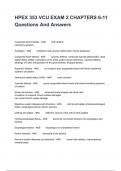HPEX 353 VCU EXAM 2 CHAPTERS 6-11
Questions And Answers
Congenital abnormalities - ANS birth defects
caused by genetics
Teratogen - ANS substance that causes malformation during pregnancy
Congenital heart defects - ANS cyanotic defects, ventricular special defect(VSD), atrial
septal defect (ASD), coarctation of the aorta, patent ductus arteriosus, cyanotic defects,
tetralogy of Fallot, transposition of the great arteries, tricuspid atresia
Acyanotic defects - ANS no mixing of poor oxygenated blood with blood reentering
systemic circulation
Ventricular septal defect (VSD) - ANS most common
Cyanotic defects - ANS poorly oxygenated blood mixes with blood reentering systemic
circulation
Sickle cell anemia - ANS abnormal sickle-shaped red blood cells
circulation is impaired, blood vessels damaged
can cause chronic organ damage
Digestive system diseases and disorders - ANS cleft lp and palate, tracheoesophageal
fistula, esophageal atresia, pyloric stenosis
Cleft lip and palate - ANS defective closure of the soft or hard palates
Tracheoesophageal fistula - ANS abnormal connection between the esophagus and
trachea
Esophageal asteria - ANS esophagus not completely formed
Pyloric stenosis - ANS narrowing of the pylorus
Nervous system diseases and disorders - ANS neural tube defects, hydrocephalus,
cerebral palsy
,Neural tube defects - ANS occur in the first month of pregnancy due to failure of neural
tube to close spina bifida, meningocele, myelomeningocele
Hydrocephalus - ANS too much cerebrospinal fluid (CSF) in brain vesicles
Cerebral palsy - ANS permanent, bilateral, non progressive paralysis
result of developmental defects of the brain
trauma during or after the birth process
spastic or athetoid forms
Malrotation with volvus - ANS malformation of intestines during 10th week of pregnancy
Hirschsprung disease - ANS obstruction and dilation of the colon with feces
Omphalocele - ANS intestines or other organs poke through the navel when abdominal
wall fails to close
Cryptorchidism - ANS testes do not descend into the scrotum from the abdominopelvic
cavity
Defects of the ureter, bladder, and urethra - ANS duplicated, retrocaval, or ectopic orifice of
utter,ureterocele,exstr-ophy of bladder, congenital bladder diverticulum, hypospadias,
epsipadias
Tulips varus, valgus, equinus, or calcaneus (clubfoot) - ANS congenital deformity in which
the foot is bent
Hip dysplasia - ANS abnormality of the hip joint
Duchenne muscular dystrophy - ANS progressive bilateral wasting of the skeletal muscles
Cystic fibrosis - ANS exocrine gland disorder, copious amounts of mucus clog bronchi,
lungs, pancreas
Phenylketonuria - ANS error in phenylalanine metabolism
Down syndrome - ANS extra chromosome 21, most common cause of congenital
abnormalities
Fetal alcohol syndrome - ANS physical, mental, behavioral problems caused by
consumption of alcohol by the mother during pregnancy
, Tourette - ANS nervous system disorder, individual makes involuntary repeated tics and
sounds or movements
Cost of mental health care - ANS 26.2% of U.S. population diagnosed with a mental
disorder each year
will account for 15% of total burden of disease by 2020
mental disorders not always covered by health insurance
Types of Diagnosis - ANS DSM-V, APA, guide to diagnostic criteria
Assessment for suspected mental disorder includes - ANS appearance, speech, motor
activity, mood, perceptions, thought content, judgement
Hallucinations - ANS false perceptions, perceiving something or someone that is not really
there
Thought content - ANS delusions are false beliefs
Nature - ANS already determined; difficult or impossible to alter
Nuture - ANS continuously influenced by others
Heritability - ANS a genetic or inheritable trait
Depressive disorder - ANS feelings of hopelessness, worthlessness, guilt, despair, difficulty
working, sleeping, enjoying life
Depressive disorders - ANS major depressive disorder with permpartum onset (PPND),
major depressive disorder, persistent depressive disorder (dysthymia)
Serotonin - ANS a chemical messenger in the brain known to play a role in depression
Bipolar disorder - ANS cycling between depression and mania ask manic-depression
Etiology is essentially unknown
Bipolar 1 - ANS manic episode/depression
Bipolar 2 - ANS depression episode are longer/maniac
Schizophrenia - ANS altered sensory perception with physical and psychological changes;
affects brain functioning, behavior patterns, and the five senses
Catatonia - ANS psychomotor disturbance




